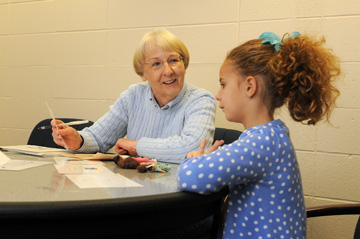Purdue Profiles: Elaine Blakemore
September 24, 2013
 |
|
Elaine Blakemore, professor of psychology and associate dean of the College of Arts and Sciences at Indiana University-Purdue University Fort Wayne. (Indiana University-Purdue University Fort Wayne photo/Jim Whitcraft) |
Elaine Blakemore is fascinated by gender development in children -- and how that development can affect their entire adult lives.
Blakemore is a professor of psychology and associate dean of the College of Arts and Sciences at Indiana University-Purdue University Fort Wayne. She has been studying children's gender development since the 1970s, teaches budding psychologists at IPFW and mentors junior faculty members as they navigate the promotion and tenure process.
How have you studied children's gender development?
From the late 1970s until the early 1990s, I looked at how boys and girls interact differently with babies. One of my most interesting findings was that girls, even at 3 years old, had more interest in general in interacting with infants than boys. But when I looked at families with nontraditional attitudes about gender, their boys were just as interested in the infants as girls.
I've also done a variety of research in recent years about gender development, including a fairly widely known study published in the mid-2000s about the characteristics of boys' and girls' toys. And along with two colleagues from Penn State, I've written a book called "Gender Development," which we're in the process of updating now.
For the last half-dozen years, I've focused on examining the relationships between parents' gender-related views and the gender development of their children. My lab is actively researching that topic now.
How has gender development in children evolved during your career?
Children today still have stereotyped, gender-based attitudes and interests, just as they did 30 or 40 years ago. But as time has progressed, we've seen children with more freedom to hold a variety of gender-atypical interests.
Having gender-atypical interests, though, is much more prevalent in girls than in boys. Similarly, personality characteristics are now associated less rigidly with gender, but more so in girls than boys. For example, people are uncomfortable with overt femininity in sons, while they are almost proud of masculine interests, to a certain degree, in girls.
If you look at the marketing of children's clothes and toys, it's obvious there's still an enormous amount of gender differentiation of behaviors and characteristics. In some ways, those societal attitudes will never go away, because gender is a very basic decision at a biological level, and it has reproductive implications. However, a lot of gender-related attitudes, especially toward children, are unnecessary, are limiting and can even be harmful.
Why is it important to study gender development?
There's almost nothing that shapes people's lives more than gender -- it is a basic division in every society in the world. From my perspective, studying it and understanding it is one of the more important things people can study about human behavior.
Strict gender roles can be harmful because they are limiting. When there are not as many opportunities for women to express their talents, their human capital is diminished and that's harmful. You don't want to overstate the case -- little girls being obsessed with pink, for example, is relatively trivial -- but more pronounced examples of gender roles can become a problem. There are also aspects of male gender roles that are harmful.
When you focus solely on a person's gender and a role they're supposed to fulfill, it takes away an aspect of the human experience from them. Their human capital, which might well serve society, is diminished simply because of their gender.
What are your duties as a teacher and administrator?
As a professor, I teach in IPFW's psychology department. I teach things such as child psychology and gender development, and I have an affiliation with the women's studies program here. I've had dozens of undergraduate research assistants over the years -- they gain experience with data collection and measure delivery methods related to children's gender development.
As associate dean for faculty development, my predominant responsibility is to work with junior faculty members as they navigate the promotion and tenure process. I help them get acquainted with IPFW, find them relevant resources if needed, review their dossiers and things like that. It's been a very rewarding role for me. In addition to examining an important topic in psychology, I get to help others further their careers, and that's been wonderful.
Writer: Amanda Hamon, 49-61325, ahamon@purdue.edu
